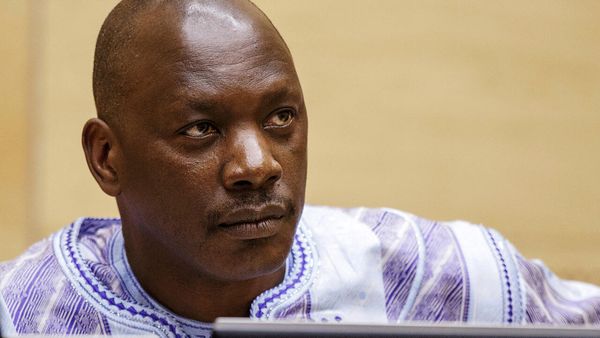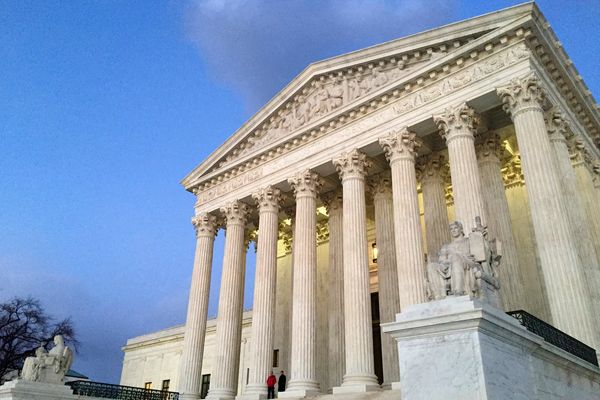What might our lives look like decades from now, when the effects of climate change have progressed even further? That’s the premise of “Extrapolations,” Apple TV+’s star-studded series from Scott Z. Burns.
Burns might be best known as the screenwriter of 2011′s “Contagion,” which anticipated many of the fears and outcomes of the pandemic. He’s doing something similar as it pertains to our ongoing climate disaster. Of flooding and fires. Or droughts and air so polluted that people must carry a personal oxygen supply with them. The series jumps forward over the course of eight episodes, beginning in the year 2037 — not that far in the future! — and ending in 2070.
It’s also a meditation on the evolution of technology, along with stubbornly entrenched corporate greed that is making the planet increasingly inhospitable to life.
There’s a lot to admire about the show’s ambitions, even if they’re not fully realized. The psychological fallout is palpable. A low-level despair and resignation has settled over everything and you might argue that’s happened in the real world already. You would be right, but it’s not hard to imagine that deepening. Even so, life goes on somewhat unabated for those lucky enough to have a financial cushion. People still have dinner parties. They still fall in love. The production design envisions a future that is at once recognizable but distinct from our own present moment.
The first episode is a cacophonous scene-setter. It’s one of the weaker chapters of the series, but it pinged all my anxieties and paints a stark picture: Street protests are futile when ruthless captains of industry are dictating the path forward. Matthew Rhys plays a sleazy real estate developer who sneers at anything but profits. When the sea levels rose? “We made a fortune retrofitting the buildings. And guess what? When it goes up another couple of inches, we’ll retrofit it again and make even more money.”
Here’s what you need to know about global warming, he says: “It will all go to (expletive) at the end of the century, one hundred percent. We’ll be dead — we’ll have to miss it — but we’ll be smiling in our gold-plated coffins, so let’s focus on the now.” The scene is blunt and artless and Rhys’ performance lays it on so thick that anyone watching who might qualify as a real-world equivalent will likely shrug off the critique, able to assure themselves: “I’m not like that.”
A pop star (Heather Graham) has accompanied this creep and his dental veneers on a business trip to Russia, and as they talk in their hotel suite, the view outside is of blue skies, palm trees and the ocean in the distance. There are sounds of seagulls. “Where is that?” she asks looking out the window. Somewhere tropical, he tells her: “I’m not even sure it exists.”
She clicks the remote and reality comes into view (gray, urban St. Petersburg) and you realize: Oh, it’s a smart window.
These two qualities — the technology that enables something like a smart window, and the crass “let’s pillage the earth before we die” mentality that makes a smart window so surreal and pointless — are constantly being interwoven over the course of the season. It’s lucrative to be on the wrong side of right.
I like that “Extrapolations” is asking serious questions. It’s not a hectoring approach but one designed to be entertaining, its themes delivered in a gleaming package filled with boldface names: Meryl Streep, Kit Harington, Diane Lane, Gemma Chan, David Schwimmer, Keri Russell and more.
The series is conspicuously focused on either the comfortably middle class or the ultrarich, the latter of whom are forever manipulating the levers of power and global resource management. The people who experience the worst effects of these decisions, losing access to water or livable environments, are mostly an abstraction. It makes you wonder who the target audience for this series actually is — and whether it will have its intended effect. These are all individualized stories and I found it curious that “Extrapolations” never contemplates the possibility of collection action and what that might look like against seemingly unstoppable — but not entirely invulnerable — corporate and political interests.
Another running thought: Why do environmentalists not exist in this vision of the future? And by that I mean: Regular people who are environmental activists in their own daily lives.
In one episode, Sienna Miller plays a conservationist working for a company that collects DNA-based intellectual property. The goal: To bring back extinct species at some point in the future, be they elephants, wolves or humpback whales. If you thought zoos were unethical now, this anticipates just how much worse things can get. It’s all driven by potential profits.
Another episode starring Edward Norton debates the merits of geoengineering, which is premised on the idea that dumping chemicals into the atmosphere can lower temperatures. The stakes are dire; maybe any attempt to stop global warming is worth a try. But no one can predict what will happen once you crop-dust the planet. The outcomes could create a whole new set of problems (and corruptions).
Sometimes you need to see something in a fictional context to be able to imagine what that might look like in real life. With climate change, inaction is a problem — but so is constant action that results in more destruction. “Extrapolations” is an invitation to speculate about all of that in meaningful ways.
To that end, I was surprised that environmental racism isn’t woven into these different narratives. When I interviewed Burns a couple years back about “Contagion,” we talked about the pandemic disproportionately affecting the lives of Black people and other people of color — and that the movie failed to consider this. I asked if he had to do it over again, would he include that as a narrative? “A hundred percent,” he told me. “It was a blind spot, and if I could go back or if I was writing the movie today, that would be a huge storyline.”
That he didn’t take that opportunity here is a choice, and one that feels like a dodge. Whose lives are deemed valuable or disposable by the select few making large-scale decisions? These are worthy questions any show about climate change should be grappling with.
As the series heads further into the future, tech innovations play a bigger role. One episode centers on a man (Tahar Rahim) who earns his living as a sim. Using AI technology, he can transform his appearance into anyone of his clients’ choosing. Usually it’s a dead loved one and his appointments function as brief moments of reincarnation, even if the client knows it’s not real. Another episode starring Marion Cotillard, Forest Whitaker and Tobey Maguire plays out like a mediocre riff on “Who’s Afraid of Virginia Woolf?” with a futuristic backdrop. The finale is a dystopian courtroom drama, putting a billionaire on trial for his crimes of ecocide, but the story lacks the narrative snap and structure of a good legal drama.
Only two episodes really stand out for me. In one, Daveed Diggs plays a rabbi in Miami trying to keep his temple from flooding; in the meantime, congregants wear rainboots to services. The episode is contemplative and also angry in all the right ways — instead of just adjusting to a new normal, younger generations will be asking the harsh questions: Why is this happening? What is this all for? The episode takes place during Passover, and the story of Moses and the plagues becomes an overt metaphor.
But the episode is also funny and I think this is key. The rabbi’s mother considers taking a “relo” deal — relocating north where temperatures are cooler — and he tries to convince her otherwise. You love it in Miami, he says. And your doctor is here. “I’m moving to Milwaukee actually,” her doctor pipes in. “I took the relo deal — not bad, I can share the details if you’d like. They threw in an assault rifle as an incentive.”
As things worsen, what does that mean for your average person whose mere existence becomes increasingly fraught? An episode that takes place in India gives us a glimpse. The year is 2059 and a young man is hired to drive a truck carrying unknown cargo to a particular location. It’s all very hush-hush. He’s accompanied by another man, there as his bodyguard. The bodyguard lost a leg while serving in the army and he uses a wheelchair. This is striking if only because he is one of the few prominent characters with a physical disability. It would have been compelling for “Extrapolations” to consider more deeply the effects of climate change (and power outages or the need for quick evacuations) on the lives of disabled people.
It’s the details that stand out in this episode. Temperatures are so hot that it’s unsafe to be outside under the sun, so there’s a daytime curfew. Life really only exists at night. But at one point the pair is forced to travel during the day. “If you’re driving on pavement, pull off to dirt,” they’re instructed, “the blacktop tends to melt.”
The odd couple performances from Indian actor Adarsh Gourav and British Paralympian Gaz Choudhry are terrific, a blend of bickering and confusion and resignation. You don’t get to know either one of them all that well, but it’s enough to make you invested in this smuggling escapade and whatever purpose it may serve.
Finally, it begins to rain. A little boy holds onto a packet of seeds and asks what they are. “I don’t know,” the driver says, but he knows exactly what they are. “Maybe they’re magic.”
———
'EXTRAPOLATIONS'
2.5 stars (out of 4)
Rating: TV-MA
How to watch: Premieres Friday on Apple TV+
———







